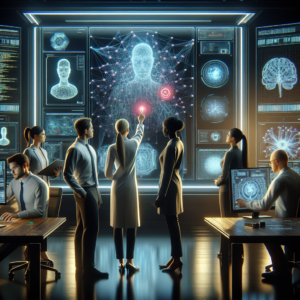How AI uncovers new ways to tackle difficult diseases
In recent years, the emergence of Artificial Intelligence (AI) has revolutionized a myriad of sectors, with healthcare being at the forefront of this technological transformation. This powerful technology is not just about automating processes; it’s about uncovering new methodologies in disease prevention, diagnosis, and treatment. As we delve deeper into how AI is playing a pivotal role in tackling difficult diseases, we will explore several key aspects of this revolutionary change.
The Role of AI in Disease Diagnosis
AI algorithms have dramatically improved the speed and accuracy of medical diagnoses. Traditional diagnostic methods, while effective, can sometimes be slow and prone to human error. AI algorithms can process vast amounts of data quickly, making it possible to identify patterns that may not be immediately apparent to human clinicians.
Early Detection of Diseases
Early detection is crucial in treating life-threatening diseases such as cancer. AI systems are being trained to analyze medical imaging, such as X-rays, CT scans, and MRIs, to identify potential tumors or abnormalities that radiologists might miss. For instance, an AI system developed by researchers at Stanford University has shown incredible promise in detecting pneumonia from chest X-rays with over 90% accuracy, outperforming some seasoned radiologists.
Genetic Disease Identification
AI is also making strides in the realm of genetics. By analyzing genetic data, AI tools can identify mutations that lead to hereditary diseases. This is not only critical for diagnosing conditions early but also for personalizing treatment plans that cater to individual genetic profiles. Companies like 23andMe are utilizing AI to analyze genetic sequences, offering insights into predispositions for certain diseases.
Drug Discovery and Development
The traditional drug discovery process can take years, often costing billions of dollars. AI is changing this paradigm by streamlining the identification of potential drug candidates. Machine learning models can predict how different compounds will interact with targets in the body, significantly reducing the time it takes to bring new drugs to market.
Predictive Modeling
AI employs predictive modeling to simulate how new drugs will behave in the body. By analyzing existing data on drug interactions, AI can forecast which compounds have the highest likelihood of success. This capability not only saves time but also reduces the likelihood of failure in clinical trials.
Repurposing Existing Drugs
Another fascinating application of AI in drug discovery is the ability to repurpose existing medications for new therapeutic uses. AI can analyze data to find connections between diseases and existing pharmacological treatments, paving the way for innovative solutions to previously difficult-to-treat conditions. For example, researchers have successfully repurposed certain anti-inflammatory drugs to treat COVID-19, demonstrating the potential of AI to facilitate rapid responses to new health crises.
Personalized Medicine: A New Frontier
AI is instrumental in the shift toward personalized medicine, where treatments are tailored to individual patients based on their unique genetic makeup, lifestyle, and environment. This approach has the potential to significantly enhance the effectiveness of treatment plans.
Patient Data Analysis
AI can sift through massive amounts of patient data—including electronic health records, genetic information, and lifestyle factors—to create comprehensive profiles for individuals. By understanding how different patients respond to various treatments, healthcare providers can optimize therapy plans, improving outcomes and minimizing side effects.
Wearable Technology
The integration of AI into wearable technology is another exciting development. Devices that monitor heart rates, activity levels, and other vital signs can feed data back to AI systems, which can then analyze trends and alert healthcare providers to any concerning changes. This real-time monitoring allows for timely interventions, potentially decreasing hospitalizations and emergency situations.
Challenges and Limitations of AI in Healthcare
While the potential of AI in tackling difficult diseases is enormous, it is not without challenges. Ethical considerations, data privacy, and the need for high-quality data are critical issues that must be addressed to ensure AI’s successful integration into healthcare.
Data Privacy Concerns
As AI systems rely heavily on data, protecting patient privacy is paramount. Healthcare organizations must comply with regulations such as HIPAA in the United States, which governs the use and sharing of medical information. Ensuring that AI technologies adhere to these standards is vital for maintaining public trust.
Bias in AI Algorithms
Another concern is the bias that can be present in AI algorithms. If the data used to train AI systems is not diverse or representative of the broader population, it may lead to disparities in treatment outcomes. It is essential for developers and researchers to be vigilant in addressing these issues to ensure equitable healthcare for all patients.
The Future of AI in Healthcare
Looking ahead, the future of AI in healthcare is bright. As technology continues to evolve, it is likely that we will see even more innovative applications that enhance patient care and improve outcomes.
AI in Predictive Analytics
Predictive analytics will become increasingly important in public health. AI can analyze trends and patterns in healthcare data to forecast outbreaks and help healthcare systems prepare for increased demand. This capability could be a game-changer in managing disease outbreaks and public health crises.
Collaboration Between Humans and AI
The most promising aspect of AI in healthcare is its ability to augment human capabilities rather than replace them. Collaboration between clinicians and AI systems can lead to more informed decision-making, with AI providing valuable insights that enhance the expertise of healthcare providers.
In conclusion, AI is a powerful tool that is not only helping to uncover new ways to tackle difficult diseases but is also reshaping the landscape of healthcare as we know it. From improving diagnostic accuracy to streamlining drug discovery and enabling personalized treatment plans, the potential for AI is vast. However, it is essential to address the challenges that come with its implementation, ensuring that the technology serves all patients equitably and ethically. As we continue to explore this frontier, the possibilities for improving health outcomes are boundless.



